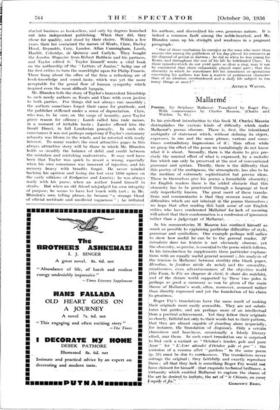:Mallarine
Poems. By Stephane Mallarme. Translated by Roger Fry. With commentaries by Charles Mauron., !•(Chatto and Wihdus. 7s. Od.) IN his excellent introduction to this hook M. Charley. Mauron distingiiishes the various kinds of difficulty which make Mallarrue's poems- obscure. There is, first, the intentional ambiguity of statement which, without defining its object, , expresses, in one and the same phrase, various and some- times contradictory impressions of it thiis often while ' we grasp the effect of the poem we tantalisingly do not know what it is about. Secondly, there is the desire to give pre- : eisely the musical effect of what is expressed, by a melodic line which can only be preserved at the cost of conventional grammar and syntax. Thirdly, there is the difficulty that this poetry of the ambiguous, the atmospheric, has also to be the medium of extremely sophisticated but precise ideas. f These in• themselves give his poems a formidable obscurity; for English readers there is the added obstacle that this obscurity has to be penetrated through a language at best only imperfectly known. The great merit of these transla- tions and commentaries- is that they ;remoye many of the ; difficulties which are not inheient in the poems themselves ; we hope that after reading this book some' of our English critics who have condemned 1lfallaiii4 for lack of meaning will admit that their condemnation is a confession of ignorance
rather than a jndgemept of .Mallanne. _
• In his commentaries: M. MaOrcin haS confined himself as :much as possible to explaining 'particular difficulties of style, 'grammar and symbolism: One exampfe p4haps 'will suffice to show how useful he can be to the general reader. M' introduire dans ton histoire is not obviously obscene, yet the obscenity, so precise, is essential to the poem which follows. In his introduction he supplements these particular explana- tions with an equally useful general account ;...his analysis of he tension in Mallarm- between sterility (the blank paper, Ilerodias, la froideur sterile du metal) and the sensuality, creativeness, even adventurousness of the objective world (the Faun, la Fee au chapeau de clarti, le chant des Matelots), 'and of the dreath. world supported" by 'these- two' poles is ;perhaps as good a summary as can be given of the main theme of Mallarme's work, often, moreover, assumed rather than directly expressed and yet the foundation of his claim to greatness.
Roger Fry's translations have the same merit of making their originals more easily accessible. They are not substi- tutes but guides, and are perhaps more of an intellectual than a poetical achievement. Yet they follow their originals iso closely, faithful not only to their words but to their pattern, that they are almost capable of standing . alone. (especially, for instance, tfle-limislation 'of Antoisse). Only a certdin !clumsiness and heaviness, occasionally a falsely literary ;effect,. mar them. In such exact translation one is surprised to find such a variant as " October's tender, pale and pure ;Azar " for "L'Azttr allendri crOctobre pole et pur " : the omission of a comma after " gardens " in the same poem '(p. 51) must be due to carelessness. The translations never outrage the original ; they faithfully and exactly reproduce them ; all that they lack is something Roger Fry would net have claimed for himself—that exquisite technical brilliance, a Virtuosity which enabled Mallarme to capture the charm of the art-he desired-to imitate, the• art of le Chinois, au coeur .
GORONWY- REA.%




















































 Previous page
Previous page